On Oct. 19, 2000, the Senate adopted a
resolution
naming the seven greatest senators of all time. This page contains some information about these Hall-of-Fame senators.
Click on a photo for the senator's Wikipedia entry.
John Calhoun (1782-1850)
Served as senator from South Carolina 1832-1845 as a Democratic Republican and Nullifier, then again 1845-1850 as a Democrat
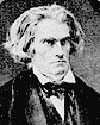
|
Many senators are colorful figures, but John C. Calhoun goes way beyond that. To say that he is
controversial is a massive understatement and his inclusion in this list undoubtedly has to do
with a compromise in the modern Senate since he is still revered in the South.
Long before John Nance Gardner said that the Vice Presidency wasn't worth a pitcher of warm piss,
John Calhoun demonstrated this by running for the Senate (and getting elected) while a sitting
Vice President. Calhoun's odd move came because he and President Andrew Jackson didn't see eye to
eye on a couple of issues. For example, he strongly believed in
nullification, the idea that a
state could declare void any federal law it didn't like, something Jackson abhored. In this case,
South Carolina didn't like a federal tariff on imported manufacturered goods, which protected Northern
factories from cheaper European goods, but simply raised prices in the factoryless South. When South
Carolina refused to collect the tariff, Jackson sent in the navy to do it for them.
Calhoun also gave a famous speech on the Senate floor in Feb. 1837 entitled
Slavery a Positive Good.
Suffice it to say, in his long career in the House, Senate, and cabinet, he was a staunch defender
of states rights and slavery. To a large extent, his legacy is the Civil War.
|
Henry Clay (1777-1852)
Served as senator from Kentucky as a Democratic-Republican and Whig 1806-1807, 1810-1811, 1832-1842, and 1849-1852.
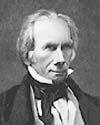
|
Henry Clay's most famous remark was "I'd rather be right than be president" but this didn't stop him
from running--and losing--four times. He was a true enigma. He was a hothead who loved drinking and
gambling but was viewed by his colleagues as a great statesman. He hated slavery, but was never an
abolitionist. He was twice appointed to fill in vacant Senate seats, but chose not to seek reelection.
While history records him as probably the best orator in the history of Congress
(he was elected Speaker of the House on the first day of his first term there in 1811--imagine a freshman
Representative pulling that off now), his real strength was forging compromises. In 1820, he played
a major role in staving off civil war by brokering the
Missouri compromise,
which admitted Maine
to the union as a free state and Missouri as a slave state. Later in 1833, he prevented the
nullification crisis from leading to civil war by brokering the
Compromise of 1833,
which lowered the tariff South Carolina had nullified.
Once again in 1850, he brokered the
Compromise of 1850,
which resulted in California being admitted to the union as
a free state, letting New Mexico, Arizona, Nevada, and Utah decide for themselves, and requiring free states
to capture and return any slaves who escaped there.
He almost single-handedly prevented the Civil War for 40 years, but after he died, there was no
one great enough to fill his shoes and the country plunged into chaos.
|
Robert LaFollette (1855-1925)
Served as senator from Wisconsin as a Republican 1907-1925
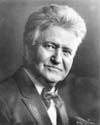
|
Although he was a Republican, LaFollette pioneered many then-revolutionary ideas for a progressive government that
served the people rather than big business.
As governor of Wisconsin from 1900-1906, he introduced primary elections,
got a civil service law passed to replace the patronage system,
regulated the all-powerful railroads, supported a minimum wage,
and taxed corporations.
After his election to the Senate in Nov. 1906, he worked hard to implement many of these same ideas on a national
scale, as well as fighting for women's suffrage, racial equality, child labor laws, civil liberties, and breaking up
industrial monopolies.
His one blind spot was foreign affairs. He strenuously opposed the U.S. entering WWI and voted against the
declaration of war, which got him labeled as a tool of the enemy. Theodore Roosevelt said he was "a skunk who
should be hanged." When the war was over, he opposed the Treaty of Versailles. In 1924, he ran for President on
the Progressive ticket and got 17% of the popular vote.
|
Robert Taft (1889-1953)
Served as senator from Ohio as a Republican 1939-1953
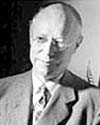
|
Although a boring speaker, Taft had a successful career in Ohio state politics for two decades before being
elected to the Senate in 1938. He was a traditional conservative and saw it as his mission to try to repeal
Franklin D. Roosevelt's New Deal. His greatest achievement was the
Taft-Hartley Act,
which greatly restricts the power of labor unions. President Truman called it the "Slave Labor Act" and vetoed it,
but the Republican Congress overrode his veto. It is still in force and commonly invoked by presidents to
stop strikes they deem against the national interest.
Like LaFollette, with whom he had practically nothing else in common, he was an isolationist, opposing the
U.S. entry into WWII and the draft. After the war he opposed NATO and did not see the Soviet Union under
Joseph Stalin as a threat to the United states. He ran for the Republican nomination for President three times,
but never got it. During his years in the Senate, he was called "Mr. Republican."
|
Arthur Vandenberg (1884-1951)
Served as senator from Michigan as a Republican 1928-1951
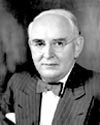
|
Initially appointed to fill a vacancy in the Senate, Vandenberg quickly rose through the ranks, becoming
Minority Leader in 1935. Throughout the 1930s, he was a strict isolationist, opposing U.S. involvement in
world affairs. After the attack on Pearl Habor in 1941, he grudgingly accepted the need for U.S. involvement
in WWII. After the war, Vandenberg concluded that isolationism was not working. From then on he was an
internationalist and supported the founding the United Nations, NATO, and the Marshall Plan. None of these
would have happened without his ability to rally the Senate to favor them. Such support from a long-standing isolationist
led to an era in which foreign policy was conducted in a bipartisan fashion. Neither party tried to get
partisan advantage from foreign affairs. Quaint as it may now sound, under Vandenberg's guidance
the two parties in the Senate worked together in foreign affairs for the good of the country.
|
Robert Wagner (1877-1953)
Served as senator from New York as a Democrat 1928-1949
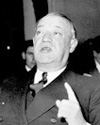
|
His most important legislative achievement was the 1935
Wagner Act,
which prohibited many common, but unfair labor practices, protected the rights of workers to join labor unions
and to strike. Employers were enraged and ignored the law. In a celebrated case, Jones & Laughlin, then the
nation's largest steelmaker, fired workers who joined a union. The fired workers sued the company, and the case
made it to the Supreme Court, which ruled that the Wagner Act was constitutional and that such firings violated it.
When the Republicans gained control of the Senate in 1946, one of the first things they did was pass the Taft-Hartley
Act, which weakened many of the provisions of the Wagner Act.
Wagner's other claim to fame was, together with Sen. Edward Costigan (D-CO),
drafting the Costigan-Wagner bill.
Had this bill been enacted, it would have made the lynching of southern blacks by mobs a crime and would also
have penalized sheriffs who failed to pursue the perpetrators. The bill was violently
opposed
by southern senators such as Ellison D. Smith (D-SC) who said that lynching was necessary "to protect the sanctity
of our womanhood" and never passed the Senate.
|
Daniel Webster (1782-1852)
Served as senator from Massachusettes as an Anti-Jacksonian and later Whig 1827-1841 and as a Whig 1845-1850
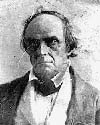
|
After a successful career as a lawyer (including several cases before the Supreme Court) and a short stint in
Congress, Daniel Webster was elected to the Senate in 1828 by the Massachusetts legislature and quickly became
embroiled in the tariff bill that South Carolina had nullified. Sen. John Calhoun, who supported nullification,
Sen. Daniel Webster, who opposed it, and Sen. Henry Clay, who sought a compromise, became known as the great
triumvirate and together they dominated the Senate for decades. Webster was appointed as Secretary of State by
William Henry Harrison in 1841. Unfortunately, Harrison, a bit of a windbag under the best of circumstances,
gave a 2-hour inaugural address in freezing weather on March 4, 1841, caught pneumonia, and died 30 days later.
He was succeeded by John Tyler (remember Tippecanoe and Tyler too?), whose economic policies Webster disagreed
with, so Webster quit and was elected to the Senate again in 1845. There he opposed the annexation of Texas but
despite his Northern roots and hatred of slavery, he supported Henry Clay's compromise of 1850 that averted
civil war for a time. He was much attacked by the abolitionists for this support, though.
|







